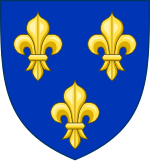
Back كنديون فرنسيون Arabic فرنسيين كنديين ARZ Франкаканадцы Byelorussian Французи в Канада Bulgarian ফরাসি কানাডীয় Bengali/Bangla Francocanadencs Catalan Fransk-canadiere Danish Französische Kanadier German Franckanadanoj Esperanto Francocanadienses Spanish
| Total population | |
|---|---|
| 4,995,040 in Canada (by ancestry)[1][nb 1] 14.5% of the total Canadian population (2016) c. 10.56 million (French-speaking Canadians)[2] 29.1% of the total Canadian population (2021) 1,998,012 in the United States (2020)[3] | |
| Regions with significant populations | |
| Canada: majority in Quebec, large minority in New Brunswick, small minorities in Northern Ontario, Eastern Ontario, Nova Scotia, Prince Edward Island and Manitoba. United States: small French Canadian American minorities in New England, New York, Michigan and Louisiana. | |
| Languages | |
| Canadian French, Canadian English, Franglais | |
| Religion | |
| Predominantly Roman Catholic, minority Protestant, Irreligious | |
| Related ethnic groups | |
| Quebecois, other French, Acadians, Cajuns, Métis, Brayons, Breton Canadians, Old Stock Canadians |
| Part of a series of articles on the |
| French people |
|---|
 |
French Canadians (referred to as Canadiens mainly before the nineteenth century; French: Canadiens français, pronounced [kanadjɛ̃ fʁɑ̃sɛ]; feminine form: Canadiennes françaises, pronounced [kanadjɛn fʁɑ̃sɛːz]), or Franco-Canadians (French: Franco-Canadiens),[4][5][6][7] are an ethnic group who trace their ancestry to French colonists who settled in France's colony of Canada beginning in the 17th century.
During the 17th century, French settlers originating mainly from the west and north of France settled Canada.[8] It is from them that the French Canadian ethnicity was born. During the 17th to 18th centuries, French Canadians expanded across North America and colonized various regions, cities, and towns.[9] As a result, people of French Canadian descent can be found across North America. Between 1840 and 1930, many French Canadians immigrated to New England, an event known as the Grande Hémorragie.[10]
- ^ Cite error: The named reference
population2016was invoked but never defined (see the help page). - ^ Government of Canada, Statistics Canada (August 17, 2022). "Census Profile, 2021 Census of Population Profile table Canada [Country]". www12.statcan.gc.ca. Archived from the original on September 20, 2022. Retrieved September 25, 2022.
- ^ "Table B04006 - People Reporting Ancestry - 2020 American Community Survey 5-Year Estimates". United States Census Bureau. Archived from the original on July 13, 2022. Retrieved October 12, 2022.
- ^ "Franco-Canadian". TERMIUM Plus. October 8, 2009. Archived from the original on August 5, 2022. Retrieved August 5, 2022.
- ^ "Peuples et habitants : Emploi de la majuscule". Archived from the original on August 5, 2022. Retrieved August 5, 2022.
- ^ "franco-canadien, franco-canadienne". USITO. Archived from the original on May 24, 2022. Retrieved August 5, 2022.
- ^ "Définitions : Franco-canadien – Dictionnaire de français Larousse". Archived from the original on August 5, 2022. Retrieved August 5, 2022.
- ^ G. E. Marquis and Louis Allen, "The French Canadians in the Province of Quebec" Archived February 24, 2017, at the Wayback Machine. The Annals of the American Academy of Political and Social Science, Vol. 107, Social and Economic Conditions in The Dominion of Canada (May, 1923), pp. 7–12.
- ^ R. Louis Gentilcore (January 1987). Historical Atlas of Canada: The land transformed, 1800–1891. University of Toronto Press. ISBN 0802034470.
- ^ "French Canadian Emigration to the United States, 1840–1930". Marianopolis College. Archived from the original on November 4, 2021. Retrieved June 18, 2014.
Cite error: There are <ref group=nb> tags on this page, but the references will not show without a {{reflist|group=nb}} template (see the help page).
© MMXXIII Rich X Search. We shall prevail. All rights reserved. Rich X Search